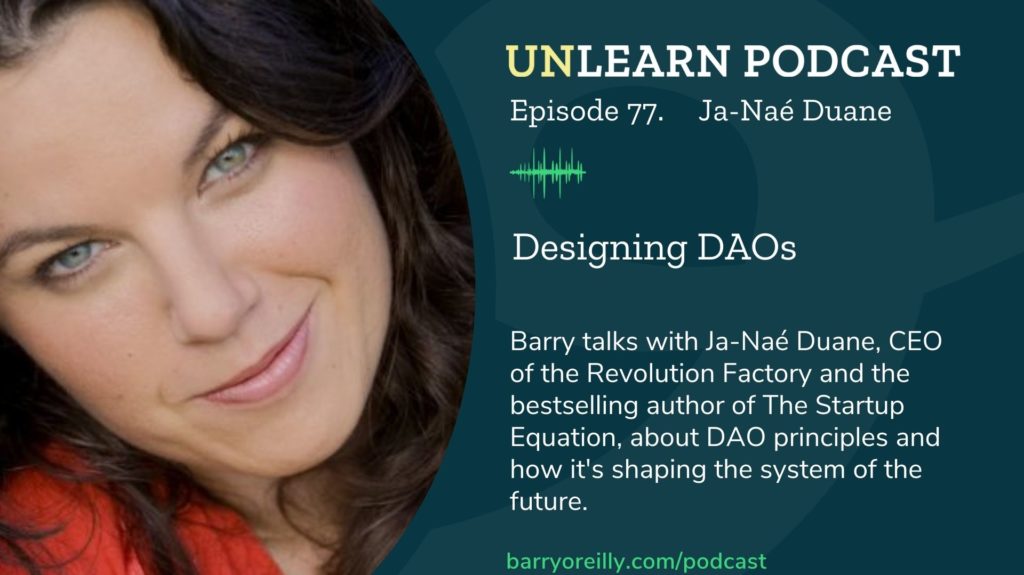Ja-Naé Duane is CEO of the Revolution Factory and the bestselling author of The Startup Equation. Her mission is to make life better for one billion people. An award-winning innovator and expert on global systems, Ja-Naé helps corporations identify trends, using emerging technology such as AI and blockchain, that will help them pave the way for the future through futures forecasting and complex system building. She also loves singing opera. Currently, she is a PhD candidate focusing her research on the future of information systems as well as a research fellow at the Center of Information Systems Research at MIT. Ja-Naé joins Barry O’Reilly in this week’s show to talk about designing Distributed Autonomous Organizations (DAO).
Everything is Interconnected
John Newton’s philosophy that everything is interconnected, is one that Ja-Naé lives by. We build on everything we learn, she tells Barry. The same is true in a company: its founding principles are connected to how those tenets are manifested in interactions with customers. “All of these things – much like nature – is very much an ecosystem,” she points out. Survival depends on the dependencies and interdependencies within the ecosystem. Likewise, the systems of the future will be enabled by interconnected technology, and we have to be ready. [Listen from 2:15]

DAO Principles
Distributed Autonomous Organization (DAO) is one of the cornerstones of Web 3.0, and as Barry puts it, “the future of how the international world could become programmable.” In a DAO business is conducted via programmable principles and smart contracts. Barry invites listeners to download Ja-Naé’s free workshop on the subject, to learn how to construct their own DAO. Ja-Naé remarks that every member of a DAO has voting rights based on their level of contribution, unlike the traditional system where only a select few dictate how the organization is run; this can really move the organization forward. In addition, a distributed web gives more opportunity for networks and collectives to emerge. “With the democratization of information that comes along with that, we are seeing these pockets of erosion around centralized models,” she continues. [Listen from 4:25]
Barry asks, “If we have to have so many people that can vote, how can these companies even get off the ground?” Ja-Naé responds that there are different types of DAOs:
- On-chain DAOs have their rules written into a blockchain, and some parts are automated;
- Off-chain or social DAOs are more collective; groups of like-minded individuals come together to make decisions. [Listen from 12:00]
Creating Value Together
DAOs transform the role of the customer from just buyer into co-creator. Ja-Naé comments, “How do we also bring customers in to co-create and really capture value with them, so that they’re building not only because they like our product or they like our service, but they’re aligned with the mission of where this company is headed?” It’s a massive shift in customer behavior that’s ripe for exploration and innovation, she and Barry agree. Barry admires this community-led approach to business: you come together with like-minded people to bring a principle or product to life, and you’re rewarded based on the role you played in creating it. He and Ja-Naé contrast how DAOs differ from the hierarchical approach to business, including how DAOs tackle funding new ideas through NFTs. “It’s really interesting,” Barry points out, “that we’re really starting to recognize or have a mechanism where people can gather around ideas, purposes, missions that they believe in, self-fund those missions and then every part of their contribution be recognized at a programmatic level.” The workforce of the future – the ‘liquid workforce’ – will be one where you contribute to several companies, and you’ll be judged on credibility and your last job, Ja-Naé says. [Listen from 17:50]
How to Start
Barry asks Ja-Naé to share some tips to help people get started exploring the world of Web 3.0. Try to understand blockchain and how it’s changing the world first, she urges listeners. Learn about digital twins, virtual reality and virtual worlds, as well as the metaverse. The next step is to understand crypto and NFTs; putting some ‘skin in the game’ by making a small crypto investment is a good way to learn, she comments. She gives suggestions of DAO protocols listeners can explore to learn more, including her own DAO resource. [Listen from 32:50]















